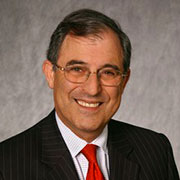Every Monday on The Drive with Steve Jaxon, on our “Mondays with Lanny” feature, we visit with Lanny Davis, longtime Washington DC attorney and in this primary election season, prominent Hillary Clinton supporter. Last Monday, Lanny gave us his perspective on the Democratic primary race on the day before the Wisconsin primary. Bernie Sanders was favored to win in Wisconsin (and he did, as the results are now in). Steve began by asking Lanny to explain whether the Sanders campaign has a reasonable case to ask the Democratic super-delegates to support Sanders over Clinton.
Lanny Davis began by pointing out the popular vote totals that both candidates have won. “After thirty-five primaries and caucuses, Hillary Clinton, steady, factual, talking solutions, not promising things she can’t deliver like free medical care for all, free public education for all, no tax increases, the revolution is here. After all is said and done after 35 out of 57, so we’re more than half way done, she leads, 2.5 million more votes than Bernie Sanders. And what’s remarkable to me and I wrote the column for this reason, is how many people are shocked? “Oh she doesn’t lead by that many?” Because if you follow the media you would actually think that Bernie Sanders has more votes, because he’s the populist, he’s the “feel the Bern” candidate. That’s a lot more votes, by 2.5 million. So there’s no argument for any super delegate to switch along the lines of the Sanders campaign to “follow the popular will.” which is an expression that Senator Sanders used on a Sunday show. It’s exactly the opposite. You should be for Hillary Clinton if you’re following the vote, by 2.5 million, that’s a lot of gap. That’s 56 to 44 percent of popular vote, that’s called a landslide.”
Steve pointed out that last week, Lanny had mentioned that Sanders would need 67 percent of the remaining delegates, which is a lot. Lanny then explained his take on the super-delegates and the case that a candidate needs to make to them.
“The only way he can do this is by converting pledged super-delegates. Who are they? Democratic governors, Democratic senators, Democratic members of Congress and party officials elected by their Democratic members in each of their states. So somehow Bernie Sanders wants to convince us that a Senator who wins 2.5 million votes to win an election is less democratically representative of a diverse population than, let’s say, 60,000 people in the state of Utah (hasn’t gone Democratic in a long time) who turned out for the caucuses, and Bernie Sanders won a net 21 delegate victory in Utah, with 65,000 votes, compared to 1.1 million votes that turned out in Ohio which Hillary Clinton won by a landslide and only gained 19 delegates. 1.1 million turnout in the swing state of Ohio which she won by a landslide, 65,000 votes in the red red state of Utah, which Sanders won by 21 votes gap. Now which is democratic, small D.”
He went on to explain the diference between open and closed primaries and how the results in these different states also favor Hillary Clinton. “Among Democratic voters, Hillary Clinton has led by 10 to 20 percent in every single poll, in every single exit poll. So if the remaining contests were mostly open to Independents and Republicans then at least Bernie Sanders would say, ‘I’ve got a good calendar left,’ but in this case the calendar favors Hillary Clinton, since the majority are primaries for Democrats only, which is, in my opinion, what primaries ought to be.”

